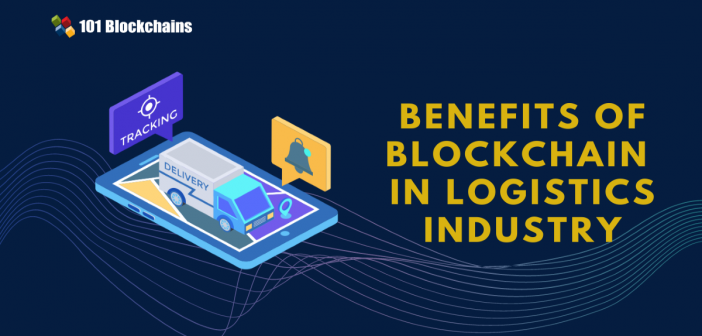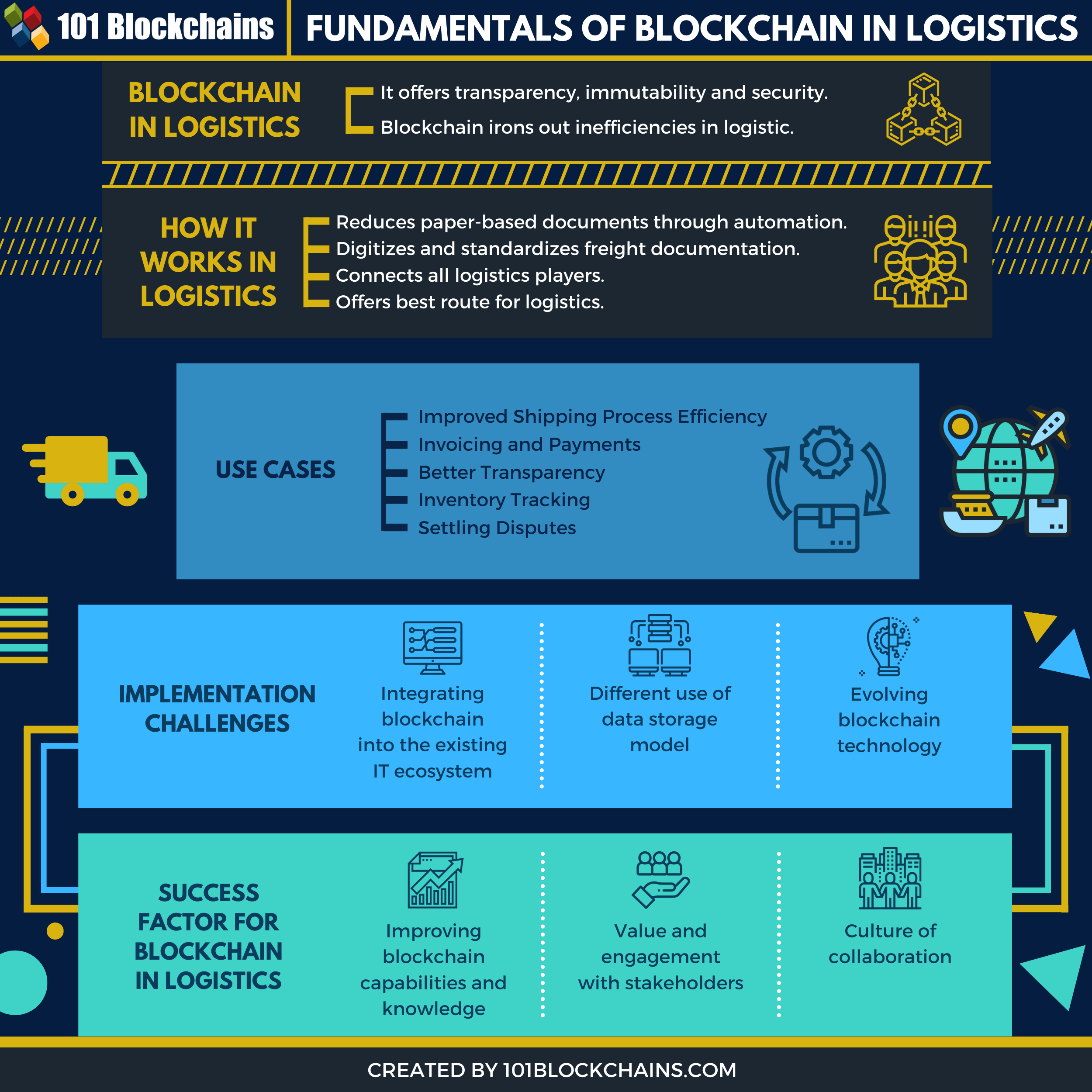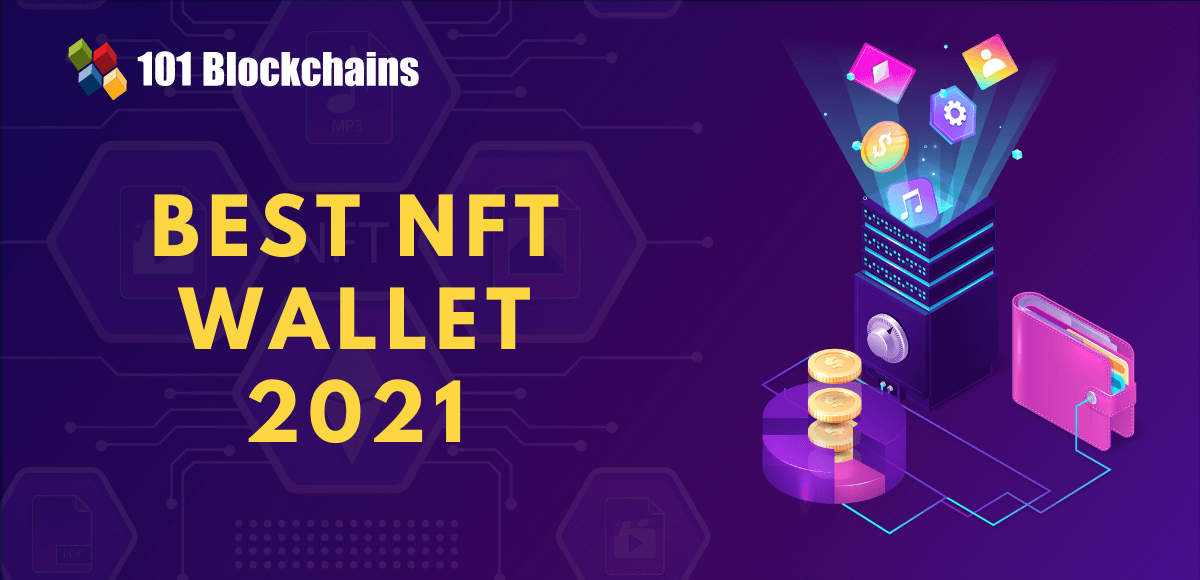Learn how blockchain truly works, master key definitions, and uncover what makes smart contracts so "smart." Dive into the fundamentals, gain valuable insights, and start your blockchain journey today!

- Reviews
101 Blockchains
- on February 20, 2021
Benefits of Blockchain In Logistics Industry
This article will focus on understanding the role of blockchain in the logistics industry and how it helps to improve it.
Logistics is one of the key elements of the current industry. It ensures that items reach their intended place in minimal time, cost, and damage. In short, it deals with the implementation and organization of complex operations for transporting goods from one place to another (generally from the point of origin to consumption).
The current logistics industry is huge! In the USA alone, $791.7 billion worth of revenue came just in the year 2020. It’s astronomical in terms of numbers, and that also makes the logistics industry one of the most complex ones out there.
Blockchain technology offers a decentralized network where peers can communicate and do transactions without the need for a centralized authority. Its decentralized nature brings in many benefits, including immutability, transparency, and security. More so, it’s perfectly suitable for logistics industry as well.
Build your identity as a certified blockchain expert with 101 Blockchains’ Blockchain Certifications designed to provide enhanced career prospects.
What is Blockchain in Logistics?
The best possible way that blockchain can help logistics is to solve its inefficiencies. Right now, almost every element of a logistic chain has tons of options to deal with. These options include the “What if” scenarios.
Brokers, shippers, and others need to focus on efficiency rather than getting stuck while choosing the best option. On top of that, there has always been tons of documentation that is required to be done. The documentation process adds more inefficiency to already slow end-to-end transportation.
At the core, it is the lack of a single source of truth and complex process that brings the whole logistic process down. There is a need for a decentralized entity that can process all the transactions and also act as a center to verify and improve the whole process.
It will handle everything, including providing the means to record transactions, create an efficient and transparent system, and also track assets with all required documentation.
As blockchain is digital in nature, documentation needs to be done online, giving everyone access to the data from anywhere they want.
Please include attribution to 101blockchains.com with this graphic. <a href='https://101blockchains.com/blockchain-infographics/'> <img src='https://101blockchains.com/wp-content/uploads/2020/02/Blockchain-In-Logistics.png' alt='Blockchain In Logistics='0' /> </a>
How Blockchain Technology Works in Logistics
To get a better understanding, we need to understand the different steps in logistics and how blockchain technology needs to be implemented there. Let’s look at the key players in the logistics pipeline and their role when it comes to using blockchain technology.
Below, we will discuss the key elements of the Logistics Blockchain Consortium. It is an attempt to integrate blockchain into the logistic pipeline fully. It will also help you to understand the benefits of blockchain in logistics systems.
Start your blockchain journey Now with the Enterprise Blockchains Fundamentals
-
Logistics Blockchain Consortium
The logistic blockchain consortium is founded for the Australian shipping industry. It is currently managed by EY, where the members include BVL, DB Schenker, LKW Walter, and other standard bodies and digital subsidiaries.
The purpose of the consortium is to standardize and digitize the freight documentation. It includes all the documents, including the certificate of origin, consignment notes, and so on. By doing so, the firms will be able to automate 75 million processes per year. In return, they will save anything around 12 million paper sheets.
-
Manufacturer
The manufacturer is responsible for product manufacturing. They should also provide a certificate of origin, processing data, barcodes, batch number, and shipment dates.
All of the information needs to be stored and encrypted in a distributed ledger. To do so, the manufacturer’s systems should always be connected to the internet. The manufacturer should also utilize smart contracts to automate and orchestrate shipment transaction flow. The flow depends on multiple factors, including algorithms, codified parameters, and algorithms.
-
Supplier
The supplier receives all the necessary information from the manufacturer and creates its own set of documentation to share with the next player in the logistic process. The supplier needs to create a packing list, batch number, order number, production date, and shipment specifications (DIMS)
-
Logistics 3PL
The next player in the logistics is the 3PL. They are responsible for generating and automating routing instructions, bill of lading, commodity description, and shipment date.
-
Long-Haul Carrier
The information is then next passed to the long-haul carrier, who is responsible for maintaining and generating temperature, shipment status, and delivery signature.
-
Warehouse
The Long-Haul carrier then dumps the goods to the warehouse. The warehouse then works on the routing instructions, packaging barcode, specifications, and pick date.
-
Short-haul carrier
The short-haul carrier then takes the goods to the consignee by keeping the details automated and generated, including invoice number, receive date, customer ID, delivery receipt, and shipment status.
-
Consignee
The consignee receives the product with all detailed information stored in the blockchain.
In the whole process, there are three major steps.
- The manufacturers are responsible for transmitting goods to warehouses, suppliers, and 3PL providers.
- The 3PL provider, on the other hand, ensures that the shipment and capacity are optimized in real-time. It should also make sure that it optimizes itself correctly so that new loads can be received.
- In the last step, the 3PL providers are responsible for shipping the goods to the carriers. They should also make sure that visibility is provided at all steps. Lastly, the carrier should also offer the shipment status at all stages of shipment.
Blockchain in Transport Alliance (BITA)
Another blockchain alliance, working in transport and logistics. It were founded in Aug 2017. The alliance has grown strong from its inception. Right now, it has more than 500 members participating from 25 countries. The alliance has the goal to drive the adoption of new technologies among the transport, freight, logistics, and other related industries.
This also means that they are pushing the adoption of distributed ledger technologies (DLT) such as blockchain. The key elements include embracing a common standard, education, and collaboration.
Use Cases of Blockchain in Logistics
There are many blockchain logistics applications. To get a good understanding, let’s take a look at the five blockchain logistic applications. It will also help you to understand the benefits of blockchain technology in logistics.
-
Better Freight Tracking
Using blockchain in logistics systems and supply chains can help you handle help you track down freight more easily. At present, same-day deliveries and on-demand deliveries are increasing. So, it can quickly become a burden for logistics companies as they don’t have the infrastructure to meet up with the needs for these overwhelming demands.
Many trucking companies are trying to invest in good tracking technology, but these technologies’ security is questionable. Also, these technologies don’t have a secure authentication process. Therefore, cybercriminals or bad persons always take advantage of the network’s information.
Blockchain can really change the scenario here. As blockchain offers a proper authentication channel with verification, no one can tamper with the data. Also, as you can keep track of all your deliveries and track the deliveries in real-time, it can really ensure a better consumer experience for the logistics industry.
-
Improved Shipping Process Efficiency
With blockchain, the first thing that will improve logistics is shipping and freight. In short, it can be used to improve the delivery process internationally and locally. It will also make them improve their goods capacity and improve their process efficiency.
Maersk already knows the importance of blockchain and has already incorporated blockchain into its processes and operations. They are one of the largest shipping container operators. The end goal is to track the shipment in the best possible way by working with other authorities. IBM is also working with Maersk to improve the global trade infrastructure.
The blockchain in supply chain will surely help save millions of dollars.
-
Security for the Internet of Things (IoT) Devices for Increasing Efficiency
Many companies are already using Internet of Things devices to track the products or maintain the quality all the time. However, these IoT devices are prone to cyberattacks because they tend to use cloud servers to communicate with each other, which is a vulnerable process.
So, here, blockchain in logistics and supply chain can offer security for these IoT devices and monitor all the data that comes from all of these devices. More so, it can also help analyze and categorize all the data from these devices to make changes in the business strategy.
Want to learn how you can use blockchain in the Internet of Things (IoT)? Enroll in Getting Started with Blockchain And IoT Course Now!
-
Better Transparency
Blockchain’s one of key features is transparency. If implemented right, blockchain for supply chain offers better transparency, which in return affects logistics transparency. It lets companies trust each other more credibly. By having better transparency, there will be fewer invoice disputes, fewer workers exploitation, and better auditing costs.
Apart from the end consumers, the B2B business will implode due to the improved credibility and integrity. The trust means that the auditing costs, invoice disputes, and other aspects of conflict will be reduced to a great level or even removed.
There are already companies that are investing in making transparency better. One such company is the Provenance company that has conducted case studies to see how blockchain can improve logistics aspects, including the supply chain.
Want to learn about supply chain in blokchain?, Enroll Now in Enterprise Blockchains and Supply Chain Management Course
-
Inventory Tracking
Inventory tracking is complex. Companies spend a lot of money to make it perfect and efficient. And, even then, it offers a lot of problems. That’s why inventory tracking is one of the main focuses of the industries out there. To manage it, companies spend millions of dollars.
Blockchain technology can help solve the problem by offering the ability to companies to not only manage their products at the macro level but also micro-level. For example, companies can keep full track of the logistics by monitoring it in a highly efficient manner.
One such example is IBM’s blockchain-based system. It enables companies to track food items and report their conditions throughout their transaction process. Big companies such as Nestle, Walmart, Unilever, etc., are already taking part in the project and helping to achieve the best possible result.
The end consumers will benefit the most out of it as they will always get the food items that are fresh and ready for consumption. This is one of the best enterprise blockchain use cases in this industry.
-
Settling Disputes
Another one of the applications of blockchain in logistics is settling disputes in cargo transportations. Cargo transportation always suffers from disputes. This can happen if the goods are misplaced or delayed. Disputes are hard to resolve and can easily last weeks before they get resolved. All of these mean more resource expenditure from the company.
Blockchain can resolve disputes faster with the help of immutable data and real-time information about the cargo. With automation, many disputes can be solved within minutes, backed by trustable data. It also helps companies to solve customer disputes.
-
Invoicing and Payments
Lastly, blockchain can help improve invoicing and payments through an efficient and secure system. Invoicing can be a real challenge when it is done on a very large scale. That’s why you will find systems that are efficient in invoicing and payments.
Companies can use smart contracts to automate the whole process and make it error-free and transparent. This will make invoicing and payments super-efficient as well.
Curious to learn about blockchain implementation and strategy for managing your blockchain projects? Enroll Now in Blockchain Technology – Implementation And Strategy Course!
Implementation Challenges of Blockchain in Logistics
There are many challenges that companies need to overcome to implement blockchain. Some of the challenges are as below.
- Different use of data storage model: Not all companies or systems utilize the same data model to collaborate on the blockchain.
- Integrating blockchain into the existing IT ecosystem: It will always be challenging to integrate blockchain into the existing IT ecosystem.
- Evolving blockchain technology: The last challenge is to work with blockchain itself. Blockchain is a new technology and is evolving at a rapid pace. Implementing blockchain right now will mean more implementation challenges in the future.
- The flow of Information: Another big challenge is managing the flow of information between the different entities in logistics. If the trade is international, it becomes more complex due to more entities’ entry in the whole process.
Success Factor for blockchain in Logistics
Making blockchain successful in logistics depends on many factors. A company needs to be proactive and should work towards these factors to successfully implement blockchain into their existing systems. At the core, everyone should collaborate, improve their blockchain knowledge, and drive value through it.
-
Culture of collaboration
When a new technology arrives, there is always a lack of collaboration. The same is true for blockchain. Blockchain is a technology that requires collaboration to work. One of the other reasons includes the inclusion of multiple parties in the blockchain ecosystem, including partners, regulators, industrial organizations, and so on.
One such example would be to work with competitors to create standards for blockchain to work in logistics.
-
Value and engagement with stakeholders
The stakeholders should invest their time and effort to improve value in the already existing systems or projects that are on the verge of implementation. They should provide their invaluable knowledge and also do technical feasibility.
Blockchain is a new technology and requires all the help it can get to make it mature and implementation ready.
-
Improving blockchain capabilities and knowledge
The last factor is to work towards improving blockchain knowledge and capabilities. This will help logistic companies to find new models that work in the real world.
Start learning Blockchain with World’s first Blockchain Skill Paths with quality resources tailored by industry experts Now!
Conclusion
This leads us to the end of blockchain in logistics. Logistics is one of the biggest concerns for the current generation of companies out there. If you are part of a logistics company, then the whole ball game is different. As you learned from the article on how blockchain works in logistics. The key players include manufacturers, suppliers, logistics 3PL, Long-Haul Carrier, Short-Haul carrier, Warehouse, and consignee.
The key challenges that the logistics industry right now suffers from include the use of different data storage models, integration with the current ecosystem, evolving blockchain technology, and the flow of information.
The use-cases of blockchain for logistics include inventory tracking, better transparency, settling disputes, and invoicing & payments. Even with these use-cases, there are many success factors for blockchain to succeed in logistics. If you are eager to learn more about this technology, then enroll in our Enterprise Blockchains Fundamentals Course.
*Disclaimer: The article should not be taken as, and is not intended to provide any investment advice. Claims made in this article do not constitute investment advice and should not be taken as such. 101 Blockchains shall not be responsible for any loss sustained by any person who relies on this article. Do your own research!








1 Comment
Very impressive info about the blockchain in logistics. Thanks for sharing it in a detailed way.